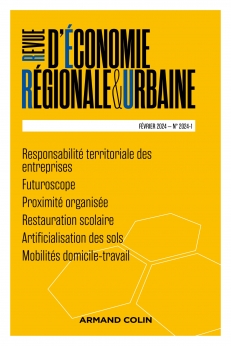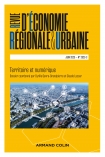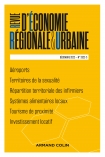
REVUE D'ÉCONOMIE RÉGIONALE ET URBAINE (1/2024)
Pour acheter ce numéro, contactez-nous
Recevez les numéros de l'année en cours et accédez à l'intégralité des articles en ligne.
Pour leur restauration scolaire, les collectivités territoriales cherchent de plus en plus à s’approvisionner en denrées alimentaires locales. Avec un focus sur l’Île-de-France, l’objectif de cet article est de comprendre comment les collectivités définissent le local, leursmotivations à s’approvisionner localement et comment cette volonté est mise en oeuvre. Nous étudions les points de vue et pratiques de six collectivités territoriales au travers d’une enquête qualitative. Nous constatons que la définition du local peut varier entre et au sein des collectivités. Les acheteurs publics font face à des difficultés pouvant freiner leur capacité à acheter des produits locaux (législation, offre locale insuffisante, etc.). En nous inspirant de deux démarches concluantes, nous posons, en discussion, l’hypothèse qu’une approche mutualisée permettrait aux petites et moyennes collectivités de faciliter l’approvisionnement en denrées locales de la restauration scolaire grâce au recrutement d’un service dédié capable de développer une connaissance approfondie du tissu économique local.
Even though favouring local goods is prohibited by the public procurement code, public buyers are increasingly keen to buy local foodstuffs for school catering. This article aims to understand what buying local foodstuffs means to public buyers and how they proceed to do so, with a focus on the Île-de-France region. In a qualitative survey, we interviewed six local authorities as well as various actors in the supply chain. We asked them to explain their perspectives and practices with regard to buy-local initiatives. In this article, we mainly use the data collected during interviews with local authorities and we found that there is no single accepted definition of what a local product is. There are almost as many definitions as there are actors. This article starts by introducing land-use planning policies in France and the will of local authorities to buy local foodstuffs. Next, we present the stakeholders we interviewed and the methods we used to collect and analyse data. Results are examined under two headings. First, the criteria public buyers value for their school catering are analysed, as well as the buyers’ motivations to request such criteria. Then, we describe how local authorities implement their buy-local strategies and the difficulties they are confronted with. Results are then discussed in light of the scientific literature. Drawing from two successful experiences, we conclude that a pooling approach for policy-making for school catering within a territory might facilitate local procurement. We assume that the standardisation of the definition of a local product and of buying practices would clarify the demands of public buyers. Having only one contact point might also facilitate dialogue between stakeholders, enabling each other to take into consideration requirements and obstacles of other stakeholders.

